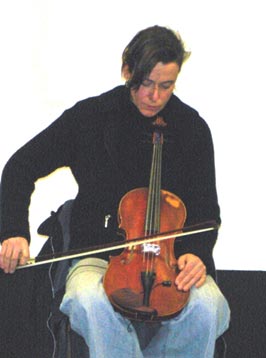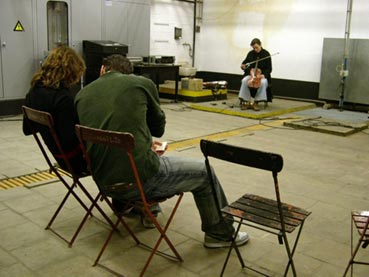
Julia Eckhardt’s room
als mijn eigen ruimte beschouw ik mijn persoonlijkheid en mijn lijf. het is niet altijd even gemakkelijk zichzelf helemaal te ‘bewonen’.
een eigen kamer als ruimte heb ik nodig als ik het gevoel heb dat de openbare ruimte niet van mij en niet te delen is.
wat echt van mij is: mijn lichaam en de vrijheid van mijn gedachten die dwalen maar bij mij thuis zijn. mijn ogen, oren en neus zijn de vensters van mijn kamer.
ik ben liever buiten dan in mijn kamer.
om autonomie te voelen heb ik niet per se een kamer nodig, dat is een misvatting die bestaat sinds Virginia Woolf. levensomstandigheden zijn sinds honderd jaar sterk veranderd: toen konden mannen over vrouwenlichamen en –gedachten beschikken. nu hebben wij veel meer zelf een verantwoordelijkheid om onze persoonlijkheid spiritueel en fysiek in te vullen en over onszelf te beschikken.
een kamer kan een bescherming zijn, een harnas, maar ook een isolement,
een opdracht, een benauwing.
__________________________________________
i regard as the room of my own my personality and my body. it’s not always easy to live it completely.
i need a place as my own when i feel that the public one isn’t my own and not sharable.
what really is mine: my body and the freedom of my thoughts which wander around but are at home by me. my eyes, ears and nose are the windows of my room.
i prefer being out then in a closed space.
It’s not always necessary to have an own place to feel autonomy, this idea seems to me a misunderstanding since the essay of Virginia Woolf. circumstances of life have changed lot since a hundred years: men could then dominate women’s bodies and minds, now we have much more the opportunity of taking ourselves the responsibility to fill in physically and spiritually our personalities an to dispose about ourselves.
a room can be a protection, an armour but equally isolation, duty, charge, narrowness.
__________________________________________
Je regarde comme ma chambre à moi ma personalité et mon corps. ce ne semble pas toujours facile de tout à fait les habiter.
j’ai besoin d’une chambre comme espace quand je resens que l’espace publique n’est pas à moi et pas non plus à partager.
ce qui est vraiment à moi: mon corps et mes pensées qui rôdent mais retournent chez moi. mes oreilles, mes yeux, mon nez sont mes fenêtres.
je préfère être dehors que dans une chambre.
pour ressentir de l’autonomie on n’a pas nécessairement besoin d’une chambre protectrice, comme Virginia Woolf le proclamait. les conditions de vie ont fort changées depuis qu’eel a écrit son essai: à l’époque c’était évident que les hommes pouvaient dominer corps et âme des femmes. aujourd’hui on a beaucoup plus nous-mêmes la possibilité d’être responsable spirituellement et physiquement de notre personalité et de prendre la guidance sur nous-mêmes.
Une chambre peut être une protection, une armure, mais représente également isolation, devoir, étouffement.
Julia Eckhardt studied viola in Rotterdam and Brussels.
She worked with several chamber music ensembles, especially in Berlin
and Brussels such as Berliner Kammeroper, Neuköllner Kammeroper,
Freies Kammerorchester, Champ d’Action, ensemble Musiques Nouvelles,
Wandelweiser Komponistenensemble, etc.
From 1996 till 2002 she was a member of the National Orchestra of Belgium.
Since 1996 she is artistic director of Q-O2 (ensemble for contemporary
experimental and improvised music). The ensemble worked with composers
such as Pauline Oliveros, Phill Niblock, Stefan Van Eycken, Jennifer Walshe,
Christian Wolff.
Since 2001, Eckhardt is a member of Incidental Music, an international
ensemble for conceptual music that works projectwise.
In 2000 she also began playing improvised music and worked with Stevie
Wishart, Els Van Riel, Jim Denley, Lucio Capece, Anthony Coleman, Robin
Hayward, Rhodri Davies.
